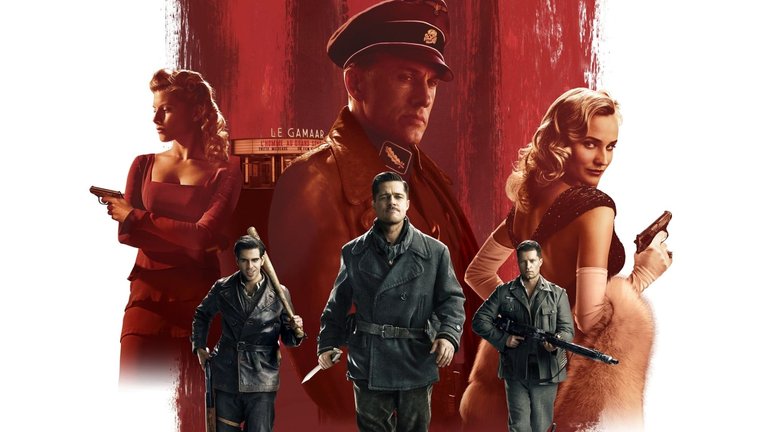
The use of terms such as “Holocaust,” “Nazis,” “Hitler,” and “Churchill” has become increasingly common in contemporary discourse surrounding military conflicts and political contests. However, these words have lost much of their original potency, primarily because the Second World War is now a distant past. The direct connection between that historical period and current events has faded, especially for younger generations who primarily engage with this chapter of history through pop culture references. Hollywood has played a significant role in this phenomenon, often blurring the lines between historical accuracy and fiction. Quentin Tarantino's 2009 action comedy Inglourious Basterds is a notable example of this trend.
Set in heavily fictionalised or, to be precise, an alternative history version of the Second World War, Inglourious Basterds begins in 1941 in Nazi-occupied France. The film introduces us to Colonel Hans Landa (played by Christoph Waltz), an astute yet merciless SS officer tasked with hunting down Jews. One of his victims is the Dreyfus family; the sole survivor is Shoshanna (played by Mélanie Laurent), who manages to escape and hide in Paris. Three years later, as part of preparations for the Normandy invasion, the US Army creates a commando unit led by Lieutenant Aldo Raine (played by Brad Pitt). This unit, comprised of Jewish American soldiers known as the "Basterds," is sent to France with the mission of ambushing and killing German soldiers. Their brutal tactics include executing prisoners and branding survivors with swastikas on their foreheads. The Basterds become part of a covert British operation aimed at eliminating Adolf Hitler (played by Martin Wuttke) and other Nazi leaders during a premiere of a propaganda film celebrating German sniper Frederick Zoller (played by Daniel Brühl). Unbeknownst to them, Shoshanna operates the theatre where this event takes place and has her own plan for vengeance involving highly flammable nitrate films.
Tarantino's cinematic style often draws from exploitation cinema of the 1960s and 1970s, and Inglourious Basterds is no exception. The film's most apparent influence stems from EuroWar films—low-budget European war action films inspired by classics like The Dirty Dozen. A direct predecessor is Enzo Castellari's 1978 film Inglorious Bastards, which shares little more than a title and general setting with Tarantino's version.
The film's release coincided with a shifting political landscape in America following Barack Obama's election as president. This transition allowed Iraq to recede into the background, enabling war stories framed as simple battles between good and evil to resurface. In this context, Inglourious Basterds provided a convenient platform for graphic violence against some of history’s most reviled figures without engaging in moral complexities and ethical implications. The film’s portrayal of violence against Nazis can be seen as an escapist fantasy that absolves viewers from enjoying such content on a base level.
Tarantino's screenwriting prowess shines through in Inglourious Basterds, transforming what could have been a straightforward revenge tale into a multifaceted narrative filled with sharp dialogue, dark humour, and rich references to film history. The film becomes a veritable treasure trove for cinephiles, featuring characters who are themselves experts in cinema or who own movie theatres. The fictional film within a film serves as a pivotal plot device that deepens the narrative while showcasing Tarantino’s love for cinema, including relatively unknown films and personalities of the early 20th century.
Despite its strengths, Inglourious Basterds falters due to structural issues inherent in its screenplay. The intertwining plots involving Shoshanna’s revenge and the Basterds’ commando mission create complexity that ultimately detracts from the overall impact of the story. While Tarantino navigates these dual narratives with skill, they occasionally overshadow one another, leading to pacing issues that contribute to the film feeling somewhat overlong. One can only speculate how much worse the final product could have been had Tarantino’s long-time editor Sally Menke, who died a year after the premiere, not been there to make necessary cuts during post-production.
As with many of Tarantino’s films, Inglourious Basterds boasts an impressive ensemble cast. Brad Pitt delivers an effective performance as Raine, while Mélanie Laurent embodies her role as Shoshanna with conviction reminiscent of characters from Kill Bill. However, it is Christoph Waltz who steals the show with his portrayal of Colonel Landa—a character marked by intelligence and menace that garnered him an Academy Award for Best Supporting Actor. Waltz’s nuanced performance elevates Landa beyond mere villainy; he embodies a complex figure whose charm belies his sadistic nature.
Upon its release, Inglourious Basterds received widespread critical acclaim and became one of Tarantino's most commercially successful films. However, its legacy could be marred by its cavalier attitude towards history, depicting the Second World War's ending in a way that did not actually occur and creating confusion among those unfamiliar with the facts and unable to set them apart from fiction. Recent surveys indicating that many young people question the reality of the Holocaust underscore concerns about how films like Inglourious Basterds may contribute to that phenomenon.
RATING: 7/10 (+++)
Blog in Croatian https://draxblog.com
Blog in English https://draxreview.wordpress.com/
InLeo blog https://inleo.io/@drax.leo
Hiveonboard: https://hiveonboard.com?ref=drax
Rising Star game: https://www.risingstargame.com?referrer=drax
1Inch: https://1inch.exchange/#/r/0x83823d8CCB74F828148258BB4457642124b1328e
BTC donations: 1EWxiMiP6iiG9rger3NuUSd6HByaxQWafG
ETH donations: 0xB305F144323b99e6f8b1d66f5D7DE78B498C32A7
BCH donations: qpvxw0jax79lhmvlgcldkzpqanf03r9cjv8y6gtmk9



